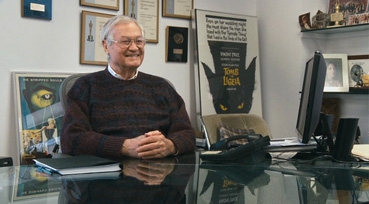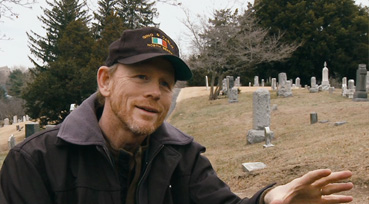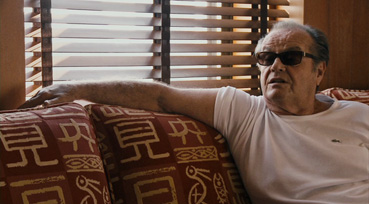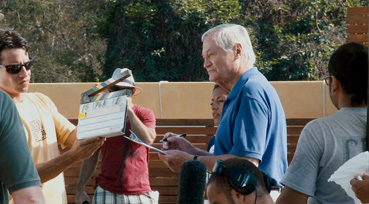| |
"Roger Corman made it OK for all of us to make exploitation movies. He showed that you shouldn't be embarrassed, there's nothing wrong with you for loving a movie like Piranha, that it doesn't mean that you're stupid for loving a movie that seems like a stupid exploitation movie. And that a lot of these films are very smart and made with lots of intelligence, and that it's OK to have fun at the movies." |
| |
Horror director Eli Roth |
| |
"Keep gambling. Keep taking chances." |
| |
Roger Corman's advice to filmmakers when
collecting his Lifetime Achievement Oscar |
It's hard to overestimate the importance of Roger Corman to American independent and even mainstream cinema. The producer or executive producer of close to four hundred films, he pretty much wrote the rule book for the production of low budget exploitation movies and in the process helped launch an extraordinary number of prestigious careers. You think I'm exaggerating? Try this lot for size: Alan Arkush, Paul Bartel, Peter Bogdanovich, James Cameron, David Carradine, Francis Coppola, Joe Dante, Jonathan Demme, Robert De Niro, Bruce Dern, Peter Fonda, Pam Grier, Curtis Hanson, Monte Hellman, Dennis Hopper, Ron Howard, Jonathan Kaplan, Irving Kershner, Jack Nicholson, John Sayles, Martin Scorsese, William Shatner, Talia Shire, Penelope Spheeris, and Sylvester Stallone. On top of that, Corman was also a director of some note, one whose CV includes a whole string of low budget genre favourites whose wit, sly political subtext and underlying sophistication often belied their sometimes microscopic budgets.

There's an interesting moment in Corman's World: Exploits of a Hollywood Rebel, an enjoyable look at Corman's remarkable career, in which Martin Scorsese reflects on the man he expected Corman to be, an abrasive, table-thumping, cigar-chewing mogul. But Corman is the almost polar opposite of this stereotypical construct, a soft-spoken gentleman with a deep and silky voice; considered, intelligent and whose own taste in films runs to the likes of Truffaut, Bergman, Fellini and Kurosawa. And he's interesting. Gosh is he interesting. I could listen to Corman talk all day and would hang on every word, and would probably buy anything he tried to sell me if he did it face to face, so enthralling and seductive is his vocal delivery. I'm clearly not the only one. Interviewed in this very film, actress Pam Grier says of her former employer, "He could talk you into buying some sand on the desert. Hey, and it'll taste good too. I'm like, excuse me, did I just buy this glass of sand from Roger?"
I've never met Corman and would still dearly love to, but back in 1981 was present at an on-stage interview conducted with him by ex-Guardian critic Derek Malcolm to coincide with a season of his films being screened at the National Film Theatre in London. It was a forthright and entertaining discussion held before a packed and attentive audience that at one point moved on to Corman's mid-60s double of Wild Angels and The Trip and the thorny subject of why they had been banned in the UK. Then, in a move that made want to leap on stage and shake Derek Malcolm's hand (years later I got the chance, when I recalled this very moment to him), he spotted the then current director of the BBFC James Ferman in the audience (he arrived late, it should be noted) and invited him to personally explain to Corman why his films had been banned. The audience, as you might expect, was unimpressed with his response.

Corman made films quickly and cheaply (if you're looking for a benchmark, his 1960 comedy-horror The Little Shop of Horrors was shot in two days on an estimated budget of just $27,000), and it's his refusal to emulate some of his exalted protégés and make the move into big-budget A-list productions that earned him the derogatory moniker 'King of the Bs'. It seems clear that this was a conscious decision on Corman's part,** a preference for the energy and freedom of low-budget genre filmmaking over the more corporate approach that now dominates studio productions. But Corman never let low budgets and cheesy effects get in the way of telling a good story and in the process directed some of the best exploitation films of the 50s and 60s, including Not of This Earth (1957), I, Mobster (1958), Machine Gun Kelly (1958), A Bucket of Blood (1959), The Little Shop of Horrors (1960), The Man With X-Ray Eyes (1963), Wild Angels (1967), The Trip (1967) and the 1970 Bloody Mama, a film whose cast list includes Shelley Winters, Don Stroud, Bruce Dern, Scatman Crothers and Robert De Niro. During the 60s, he found unexpected critical favour with a string of rightly celebrated film adaptations of Edgar Allen Poe stories, and in 1962 made a powerful assault on small town racism with The Stranger, which starred a fiery young newcomer named William Shatner. And let's not forget the bucket-full of personal favourites he's presided over as producer and executive producer, including the 1968 Targets (written and directed by Peter Bogdanovich), the 1972 Boxcar Bertha (Martin Scorsese), the 1974 Cockfighter (Monte Hellman), the 1975 Death Race 2000 (Paul Bartel), the 1978 Piranha (directed by Joe Dante and co-written by John Sayles), the 1979 Saint Jack (also Bogdanovich) and The Lady in Red (directed by Lewis Teague and written by John Sayles), the 1980 Battle Beyond the Stars (again co-written by Sayles), the 1982 Android (if you've never seen Aaron Lipstadt's little scinece fiction gem then hunt it out immediately), and the 1983 Suburbia (Penelope Sheeris), to name but a few.
Corman's World: Exploits of a Hollywood Rebel takes us on a journey through Corman's career from his first film industry job to his continued role as overseer of super-cheapie hybrid monster movies like Sharktopus and Piranhaconda. Given the astonishing volume of films Corman has under his belt, first-time feature director Alex Stapleton has set himself a task and a half to cram so much into a mere ninety-five minutes of screen time and it's thus not surprising that some things are favoured at the expense of others. There's occasionally a suspicion that the highlighted films are ones that Stapleton has a particular affection for, but is just as likely shaped by the interviews he secured and the importance of key films to Corman's career. This does lead to some imbalance, with more screen times spent on recollections of the semi-improvised shoot of The Terror and complaints about the incomprehensibility of its hastily cobbled story than all eight of Corman's highly regarded Poe adaptations combined. There is also a little too much time spent watching the shoot of Dinoshark, despite the brief but welcome chance to see Corman at work. But in other respects the film delivers the biographical goods, aided by interviews with a wide range past graduates of what became known as the Roger Corman Film School, including a good many of those names mentioned above, plus a string of former associates and, of course, Corman himself. Fans should get a small thrill from the brief chats with cult favourite Dick Miller (I certainly did), but perhaps the biggest surprise is the extensive contribution from an amiable Jack Nicholson, whose affection for Corman at one point reduces him to tears.

Corman's World is both a documentary portrait and a cinematic love letter, a welcome and fitting tribute to a hugely important and insanely prolific filmmaker who is still not as well known as a good many of the filmmakers whose careers he helped launch. With this in mind, Corman's World is a well researched and crafted and consistently entertaining attempt to ensure Corman gets the recognition and respect he deserves. Personally, I would be happy to see the running time extended to twice its present length to allow for more detailed and complete justice to be done to Corman's body of work, and have little doubt that there is plenty fine interview material left still to draw on (blink and you'll miss Robert De Niro's contribution), but Stapleton still uses his chosen running time well and has peppered the film with sometimes priceless recollections. One of my favourites has David Carradine commenting on how Corman's refusal to break into bigger budgeted films went almost hand-in-hand with his habitual approach to cost-cutting: "If he just violated this rule of his of never making a movie that cost more than a million dollars, you know, make one for a million-and-a-half or two million dollars... I said, 'Look, all your pictures make money, none of them go through the top.' And he said 'Yeah, that's true!' And then he went over and turned off the air conditioning."
Framed 1.78:1 and anamorphically enhanced, the transfer here is as clean and crisp and tonally well-balanced as you'd expect from a modern documentary shot on what looks like HD, at least when it comes to the interview material. The quality of the films clips and archive material is a lot less consistent, drawn as they are from a variety of sources and are not always in the correct aspect ratio. A couple exhibit some judder on movement, which is presumably the result of a standards conversion issue. On the whole, though, a solid job, with only minor issues of burn-out on some brightly lit whites. Whether you think even sharper looking interviews are worth picking the Blu-ray over the cheaper DVD is another matter entirely, as I can't see the clips as they are presented here benefiting greatly from the higher resolution.

There's not a huge difference between the Dolby stereo 2.0 stereo soundtrack and the 5.1 surround. Both are essentially stereo (nothing seemed to be happening at the back of the room on the 5.1), though the 5.1 does have a fuller sound that the stereo, which at times sounds just a tad tinny. Both deliver on expectations without particularly excelling, delivering clear and distortion-free dialogue and music but boasting little in the way of dynamic frontal separation. Then again, in a documentary driven by talking heads, who needs it?
There's a bit of a gulf here between what I'd like to have seen and what we actually get, given the interview material that Stapleton and his quartet of editors doubtless have sitting on their hard drives. Deleted and extended interviews would have been lovely, but all we get here is a Theatrical Trailer (1:54), which is snappily assembled and includes snippets of the very unused material that I'm aching to see.
The prospect of seeing briefly touched-on elements of Corman's career expanded on (I'd personally like to have seen more on his early work, his Poe adaptations and his increasingly anti-establishment and left-wing political views) and more of the interview material that Stapleton must have shot makes me ache for a special edition DVD, one with an expanded version of the film and/or a collection of unused material in the extra features. Maybe it will appear later, who knows. Compressing the career of someone as prolific and fascinating as Corman into ninety-five minutes means some corners have been cut, but this is still a welcome and enjoyable look at the career of one of American cinema's most important and engaging mavericks, and deserves to be widely seen and circulated, and for anyone not familiar with Corman's work it should be considered essential viewing.
|